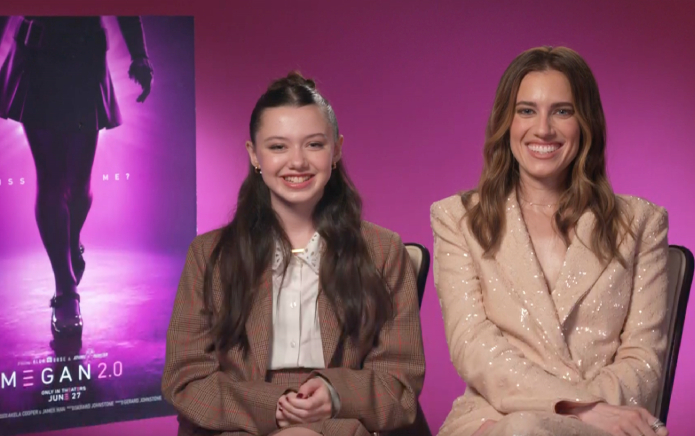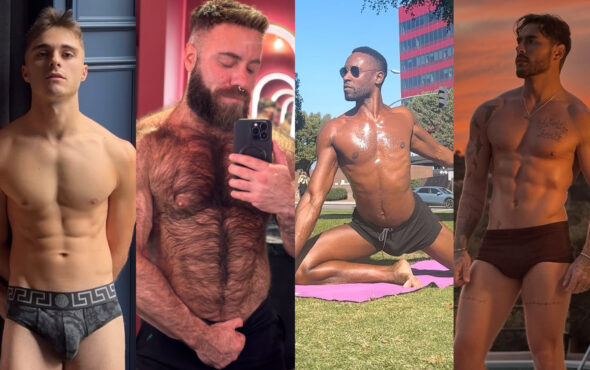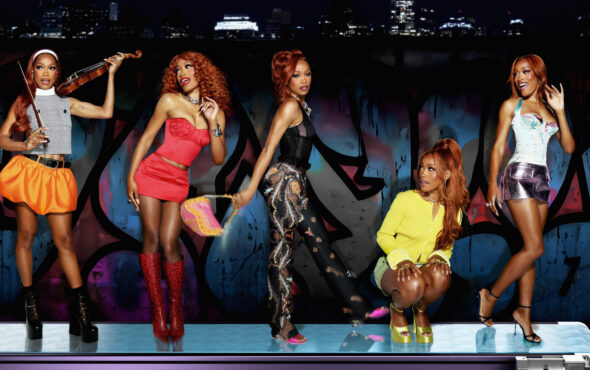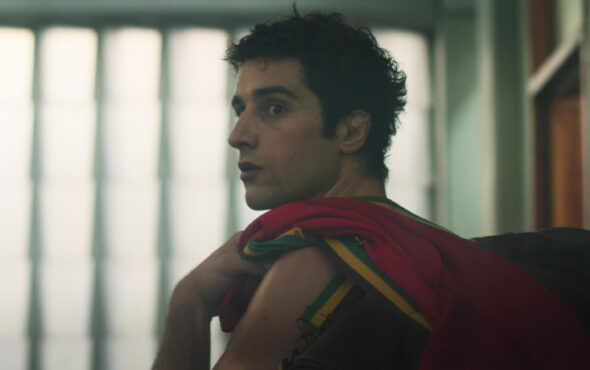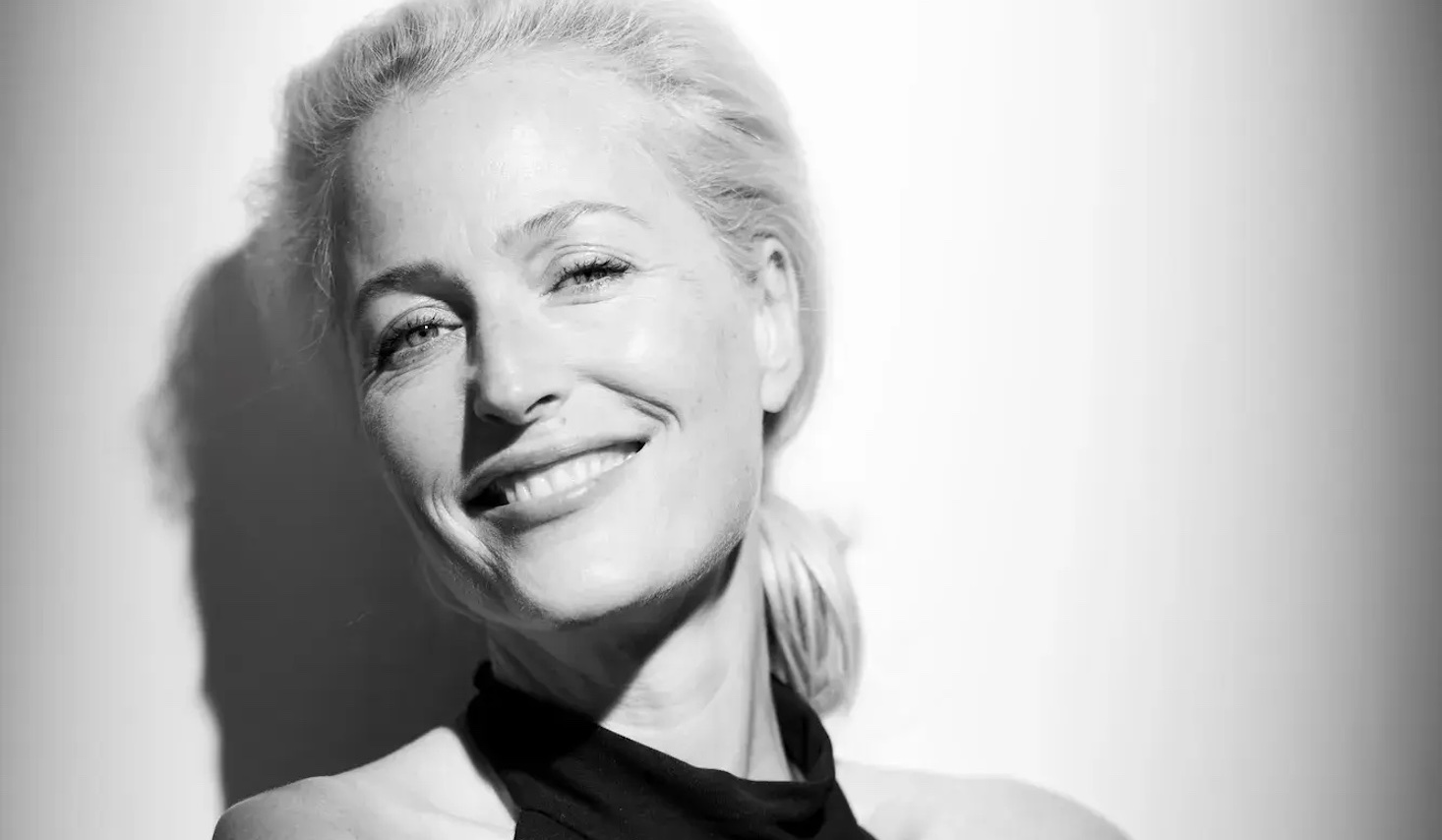
“And then, basically, he milks her,” says Gillian Anderson. (Context incoming!) The OBE and Emmy winner is gleefully reciting one of the most “extraordinary” entries in her groundbreaking new book, Want, in which she continues the iconic legacy of Sex Education’s fierce Dr. Jean Milburn to explore the “complexities” of female sexuality.
Inspired by Nancy Friday’s My Secret Garden, the book collects the desires, fantasies and kinks of countless anonymous women around the world, with entries touching upon BDSM, infidelity, shame, voyeurism and – in one case – the insatiable need to receive the “big cocks” of a group of “incredibly attractive biker men” (same!).
What makes Want even more innovative is its inclusivity, with letters from queer women, trans women and non-binary people. After all, this is the woman who blazed a much-needed bi-conic trail with her badass DCI Stella Gibson on The Fall and inspired the “Dana Scully Made Me Gay” movement. And then there’s Dr Jean Milburn, sex therapist supreme. “MOTHER!” applies to all of the above, by the way, especially Gillian.
“I wanted to make sure we didn’t go three or four letters without representation from a different race, gender or sexual preference, and that it felt like we were constantly shaking it up,” Gillian tells GAY TIMES. “It was important to have that diversity.”
Below, Gillian Anderson reflects on the creation of Want, whether the success of the book means we’re finally due for a cultural shift in the perception of female pleasure and which entry she “cackled” at the most. Spoiler alert: it’s the quote we started with from a self-described “HuCow”.
Gillian, Want is really quite groundbreaking because, as you state in the introduction, it’s still taboo for women to express sexual pleasure. Can you talk to me about what led to the release of this book, whether that’s personal or professional?
Mostly professional. After playing Jean Milburn in Sex Education, I’d received a lot of requests to do either a book as Jean or a book interviewing women about their sex lives or fantasies. My literary agent didn’t bring any of those requests to me, but then she came to me with an idea for something in the spirit of My Secret Garden. When she proposed it… On the one hand, there’s part of me that is not necessarily interested in expanding this aspect of my life. I’m not a sex therapist, I’m an actor. I’m not an expert in any way about sex or fantasy. And after this, I will continue to be an actor. But, it made sense. Post season four of Sex Education, I came out with a functional drinks brand called G-Spot, and the messaging is not dissimilar to the inclusiveness with which we sent the call out for women to send in their letters. We invited women, anyone who identifies as a woman and non-binary people to write in and courageously share their deepest, darkest desires. Bloomsbury set up a portal, a safe space that wouldn’t necessarily link back to the person who sent it. In the end I think we ended up receiving 800,000 words.
Now I see why you had enough material for eight volumes…
And so, whittling them down and deciding what the headings for the chapters were going to be, it was a big moment of trial and error. My favourite part was actually sorting them and ordering them within each chapter. It felt like a really hands-on intimate engagement with, not just the letters, but with the women themselves who had sent them in. There’s so much depth, honesty and rawness, and it’s clear the women didn’t worry about whether it necessarily made sense or was elegant or particularly well written. We wanted it to feel that you didn’t have to be a professional writer to send in a submission. You definitely feel that from the letters that we received. There’s a real variety, a real range of women who just wanted to participate and send something in.
I’m obsessed with some of the language used in this, how free these women were in their expression…
When I did my letter, my fantasy, I struggled. I’ve been around the block and there’s not much that I’m squeamish about or prudish about, I’m not nervous or shy. And I still found it a very different relationship to my fantasies to actually put them down on paper.
I’m tempted to go home and write something up myself? I’m inspired, Gillian!
It’s a really insightful exercise, I think. I would definitely encourage it for anybody. And we’ve heard from men who have read the book, a couple parents [as well] who have said that they definitely want to gift it to their daughters because it feels like a counter to the very male-centric messaging around sex, a counter to toxic masculinity. So, it does in some ways feel like it could be for anyone.
What were the most noticeable differences in how women revealed their fantasies and sexual desires in My Secret Garden to Want?
Our range of women was much greater. There’s a lot more orgasm in our book than there was back then. I expected to see more evidence of porn, just in terms of descriptives or some of the activities. A couple of the entries speak to women struggling to separate what their desire and their fantasy is from what they’re used to seeing. Maybe that is the result of a more patriarchal society, and porn is very much for the male gaze. If you’re used to that societally then maybe you think, ‘Am I recreating something I’ve seen through the male gaze, or is this actually my fantasy and does this really excite me?’ Also, I was surprised that there’s still so much shame, not just in terms of body shame and self-esteem, but being afraid to speak to their partner about their fantasies. Even asking what they want in the bedroom, as opposed to just doing what they think they should do or what the expectation is. That’s one of the reasons I was interested in doing this, to learn more about women today and because it speaks to so many aspects of women and their complexities. Also, to understand the degree to which, if we embrace this more, if we try talking about what we want in the bedroom, can that equate to actioning what we want in our lives, how we live our lives? Which can then lead to feeling more empowered and living life on our own terms.
There’s quite a few entries where women fantasise about either being dominated by a man or being the dominatrix. As you wrote in one section, there was a woman who, despite being a staunch feminist, wanted to be controlled by her male partner. What did you take away from that?
I find that really interesting. I have friends who are staunch feminists who fantasise about quite dangerous sex, and it’s surprising given how they live their lives and how they think about sex and women’s place in society. Also, what I find fascinating are the letters where women who may be CEOs, in charge of every detail of their lives, running a business and making every decision at home, wanting someone else to be in charge and take over for them. Through anonymity, perhaps, they feel they can be open and honest and self-reflective in that way, it’s brilliant. I’m sure there are women who have written, who have the equal amount of responsibility but actually still under the covers, would want to remain in charge and be the boss in terms of what they engage in sexuality. It’s just a fantastic cross-section of what goes on for women in their imaginations when they have freedom of anonymity.
View this post on Instagram
Some of these fantasies, Gillian, had me hot under the motherfucking collar. For example, the one about pirates?! I did not realise I shared this fantasy…
Right. Interesting.
Do you think the mainstream media’s rather vanilla portrayal of sex contributes to some of the shame that women have around their sexual fantasies?
I think there’s an element of that. I mean, there’s a lot in Sex Education or Euphoria or 50 Shades of Grey that is not vanilla. I can only speak for what I’m starting to understand from the submissions of this book, and also the small bit I’ve researched, but it’s been clear for some time that there’s a real epidemic of low self-esteem and shame and self-hate, fear of not living up to expectations and not being perfect, that is exacerbated by social media, billboards and magazines. Of course, that’s going to contribute to how one feels about one’s own body. That was what was so wonderful about Sex Education, is that it dealt with all of that. In dealing with that, it made it okay to have concerns, be unsure and feel self conscious. What I’m hoping Want does is create a space and a platform for everyone to identify, to feel they’re not alone, to feel that – like you said – ‘I realised I also have this fantasy’. As you said at the beginning, you’re not a woman and if that’s what ends up happening as a result of this book, that more people feel less shame about what happens in their heads and who they are, it will help them go out into their lives feeling like they deserve, belong and there’s a space for them to exist that is non-judgemental.
As you mentioned, there are so many entries in this book from queer women, trans women and non-binary people. Obviously, I wasn’t shocked in the slightest because you are Gillian Anderson, mother. Can you talk to me about that and how you made this as inclusive as possible?
So important. As I ended up sorting through individual chapters, I wanted to make sure we didn’t go three or four letters without representation from a different race, gender or sexual preference, and that it felt like we were constantly shaking it up. At the end of the day, my choices veered on the rhythm and poetry of it. So, sometimes I might switch it up a little bit to make you want to turn the next page, that it wasn’t too samey-samey. It was important to have that diversity. Also, to have the readers, actors, voice actors that are showing up to the South Bank event be representative of the cross-section we have in the book. I’m hoping we do right by every community.
Last year, you tweeted how thrilled you were about your crucial role in the sexual awakening of queer women, specifically the “Dana Scully Made Me Gay” movement. Was there a specific moment in your career where you realised that you were an icon amongst the rainbow population?
Very early on, when I was doing The X-Files. I participated in AIDS marches and concerts. I also have a longstanding friendship with Ellen DeGeneres, so I was in the presence of her experience [as an out lesbian celebrity] in the nineties to the noughties. I’m reminded of it all the time. I can’t remember what the moment was, but it was probably when I was in LA doing The X-Files. Early on, a friend of mine… I met him because he was a producer at Fox and casting director who cast The X-Files, we ended up becoming friends and one of his best friends was Jodie Foster. He produced a film called Trevor, about his life as a boy and coming to terms with his sexuality. He started The Trevor Project, which is still going today and I’m so proud to be an ambassador of. It’s still providing a call service for anyone who is struggling to come to terms with their sexuality or gender, where they can call from 24/7 around the world if they’re having dangerous thoughts, or confused or scared. That was a big part of my life back then.
There’s another iconic character of yours that I want to shamelessly bring up because a) she’s legendary and b) it feels relevant: Stella Gibson. In the past, you discussed how she opened your eyes to being more sexually-liberated, right?
Yeah. When I was playing Stella, usually when I’m filming I get quite myopic and don’t go out very much; go from set to hotel room to set to hotel room. I’d usually get in my pyjamas and focus on the next day. To go from that very familiar kind of closed space to putting on Stella’s clothes, having her hair done, stepping into her heels and blouses and skirts and her persona, which was so comfortable and confident with her sexuality, sensuality, desires… Over that period of time, shooting up there in Belfast, it started to shift something inside me and made me, I guess, more open and wanting to feel and embrace that in my own life as well. It made me feel more confident as a sexual, sensuous human being. It didn’t have to be something that I acted, I could take ownership of it for myself.
Stella is a bi-con. I need a season four…
[No answer].
Want has had such an overwhelmingly positive response. Do you think that’s proof that we’re due for a cultural shift in the archaic perception of female pleasure?
Potentially. Right now at Venice, there’s a handful of what can be safely classified as erotic films. There’s a film with Nicole Kidman called Babygirl, and then there’s Luca Guadagnino’s film [Queer]. So, it feels like a moment where the conversation is on the table and people are enjoying, sharing and experimenting with opening themselves up. Hopefully, we’ll be able to create a bit of community around, not just this book, but removing some of the fear and taboo around these topics. But, there’s also something in sharing and taking ownership of what you want in your personal life. Maybe it comes out through the imagination and creativity and fantasy, but through sharing and identifying that, it equates to asking yourself what it is you want in life. Not just from your partner in bed, but your partner in the relationship, from your work and friendships and experience of being a parent – all aspects of your life. It has a knock-on effect of empowerment for everybody, not just for women.
Of course, this book is incredibly empowering and sexual, but there’s a lot of humour in some of these entries. Was there a particular fantasy that made you cackle the hardest?
I really love the one where the woman, I think, refers to herself as a HuCow when she’s in a department or grocery store. She’s currently breastfeeding her children, but she’s so engorged with milk and needs release. So, she goes into the back room and asks a man who works there to relieve her. And then, basically, he milks her. It’s extraordinary. I loved it. If I cackled, it was more because it’s so confident. She has a need that she needs met, and she gets it taken care of. In the process, she is turned on by it. I just think it’s wonderful.
Want is out now.
